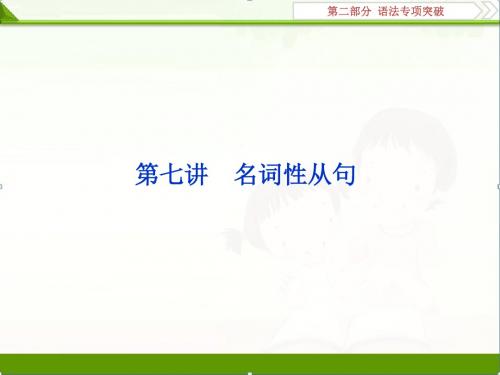第2编 专题七 代词 人教版英语高三一轮语法复习
- 格式:doc
- 大小:318.00 KB
- 文档页数:11


高考英语一轮复习语法梳理代词(13页Word文档)代词是高考考查的重点语法项目之一,也是考生容易出错的项目,因为代词具有较大灵活性。
考生在做代词选择填空时最容易犯的错误是1)机械地套用语法规则;2)用汉语思维去分析题意。
从高考考查情形看,高考考查最多的是不定代词,因为不定代词是整个代词中最为活跃的部分,其次是名词性物主代词和反身代词。
单数复数第一人称第二人称第三人称第一人称第二人称第三人称人称代词主格I youhe she itwe you they 宾格me you him her it us You them物主代词形容词性my your his her its our your their 名词性mine yours his hers its ours yours theirs反身代词myself yourself himselfherself itselfourselves yourselves themselves指示代词this that such these those such相互代词宾格each other one another 所有格each other’s one another’s不定代词可数one each, many, (a) few ,both, another, either., neither不可数much, (a) li ttle可数不可数any other all some复合不定代词anyone anybody anything somebody something someone everyone everythingeverybody nobody nothing疑问代词who whom whose which what连接代词who whom whose which what(参见第九讲)关系代词who whom whose which that(参见第十一讲)1.人称代词①在句中作主语用主格,在句中作宾语,则用宾格;She teaches them physics.②在句中作表语常用宾格;Who is it? It’s me.但有时要用主格:It was I who told him the whole story.在强调句型中,强调的是主语,故I用主格。




第3讲形容词和副词I bought an interesting① novel yesterday.The book is so interesting② that I can hardly let go of it.Worried③ about my study,my mother took it away.However,I found my mother absorbed④in it.My mother is reading the novel attentively⑤ now and she is quite⑤ moved by it.Obviously⑥,she won’t return the book to me soon.[规则感悟]①修饰名词,往往用形容词作定语。
②在系动词之后,往往用形容词作表语。
③表示情绪和精神状态的形容词可以作状语。
④在“感官或使役动词+宾语”之后,形容词可以作宾补,说明宾语的状态。
⑤副词可以描述某个动作的情况或者描述动作、行为或状态的程度。
⑥副词可以放在句首,作评论性状语,修饰整个句子。
1.形容词的构词规则类别例词加-y cloud→cloudy,luck→lucky,health→healthy,fog→foggy加-(e)d gift→gifted,talent→talented,advance→advanced,excite→excited加-ing surprise→surprising,convince→convincing,frighten→frightening,appeal→appealing,reward→rewarding,invite→inviting加-ful/ -less meaning→meaningful/meaningless,care→careful/careless,help→helpful/helpless,harm→harmful/harmless,colour→colourful/colourless,use→useful/useless,thank→thankful/thankless加-able comfort→comfortable,knowledge→knowledgeable,accept→acceptable,respect→respectable加-ous danger→dangerous,courage→courageous,humour→humorous -ce变为-tconfidence→confident,difference→different加-al music→musical,person→personal,nation→national,education→educational,tradition→traditional加-ly friend→friendly,week→weekly,love→lovely 加-en wood→wooden,wool→woolen加-ive/-ativeattract→attractive,talk→talkative,prevent→preventive,protect→protective其他常见变化energy→energetic,fool→foolish,pleasure→pleasant/pleased,science→scientific注意以一个辅音字母结尾的重读闭音节名词加后缀-y变成形容词时,要双写该辅音字母再加-y,如:sun→sunny,fun→funny等。
词类复习(1)【分类标准】根据语法填空中的没提示词的词类放在一起复习。
即冠词,代词,连词,介词。
冠词(1)考纲要求冠词的泛指和特指是冠词学习的难点之一,也是高考考查的焦点所在。
解题时考生要结合语境分析究竟设空处是表示“泛指”还是表示“特指”:1.表泛指(指一类人或事物中的任何一个,而不具体指哪一个),用不定冠词;2.表特指(特指某人、某事、某物,指上文中提到的或正在谈论的人或物,或者是谈话双方都知道的人或事物),用定冠词。
(2)命题规律1. 抽象名词属于不可数名词,前面一般不用冠词;但用来表示具体的人或事时,其前用不定冠词。
2. 比较级和最高级前冠词的选择“a/an+比较级”表示“(众多人或事物中)比……更……的一个”,属于泛指;“the+比较级”表示“两者中较……的一个”。
“the+最高级”表示三者或三者以上的人或事物中“最……的一个”;“a most+形容词”表示“很……,非常……”。
3. 冠词的固定搭配。
冠词的考点归纳:(1)定冠词的常考必备:①定冠词the与指示代词this,that同源,有“这 / 那个”之意,但语气较弱,可以和名词连用,表示某个或某些特定的人或物。
②叙述上文提到过的特定的事物或上文未提到,但听话者一定知其所指。
③用于序数词、形容词的比较级、最高级以及形容词only,very,same之前。
④用于表示地球、宇宙中的独一无二的事物尤指各种天体或世界上比较有影响的物体名词前。
⑤用于表示具体的地点、方位,具体的时间或某天的一部分等。
⑥用于表示山川、河流、海洋、群岛、报纸、杂志、朝代的专有名词及由普通名词构成的专有名词之前等等。
(2) 不定冠词的常考必备:①表示数量“一”,与one相近。
②用在首次提到的人或物之前,表泛指。
③用在物质名词、抽象名词之前,表示“一阵,一场,一种……”,也可以表示引起某种情绪的事,即抽象名词具体化使用。
④用于be of a(an)+ n.结构中,表示“相同……的”。
第1讲定语从句在复合句中,修饰某一名词、代词或整个主句的从句叫定语从句。
被修饰的名词或代词叫先行词,引导定语从句的词叫关系词,定语从句放在先行词的后面。
A real friend is someone who① walks in when the rest of the world walk out.A real friend is someone whose② support we can count on.A real friend is someone who① sees our true self,not just the face who/whom/that③ we show to the world.Yet these days,the modern tools that keep us connected are eating away at the meaning of friendship.We may be able to make many friends online,but these friendships can be quite shallow.Social media like blogs has come between us and the friends who/whom/that③ we love.Texting and messaging cannot take the place of face-to-face chatting.“Sharing”our experiences on social media is not enough to express the values which/that④matter most to us.“Liking”our friends’photos online does not develop the connection which/that④ we share.To make friends a real part of our lives,we should put down our smartphones and meet them in person.[规则感悟]①关系词指人作主语,可以用who,that引导。
专题七代词1.(2019·天津高考,3)A study shows the students who are engaged in after-school activities are happier than ________ who are not.答案:those本空指代前面的复数名词the students,同时为后面who引导的定语从句的先行词,此时应该用表示特指的指示代词those。
2.(2018·全国卷Ⅰ,70)If you are time poor, you need run for only half the time to get the same benefits as other sports, so perhaps we should all give ________ a try.答案:it give it a try “试一试”,相当于have a try。
3.(2018·全国卷Ⅲ,68)When the gorillas and I frightened each other, I was just glad to find ________ (they) alive.答案:them此处作find的宾语,用they的宾格形式them。
4.(2017·浙江高考,64)Another nice thing is that you learn both new words and ________ (they) use unconsciously.答案:their此处应用形容词性物主代词修饰名词use,指这些词的用法,故填their。
5.(2017·全国卷Ⅱ,67)However, the railway quickly proved to be a great success and within six months, more than 25,000 people were using ________ every day.答案:it it在这里指代the railway。
6.(2017·浙江高考,59)Pahlsson screamed so loudly that her daughter came running from the house. “She thought I had hurt ________ (I),” says Pahlsson.答案:myself由空格处所在句子的主语I可知应用反身代词myself作宾语。
7.(2018·全国卷Ⅱ,短文改错)... no matter how many times I asked to watch them, my parents would not let me. They would say to us that playing card games would help my brain.________________________________________________________________答案:us→me由“I asked”“would not let me”以及“help my brain”可知,此处指的是“me”。
8.(2018·全国卷Ⅲ,短文改错)I had done myself homework, but I was shy.__________________________________________________________________答案:myself→the/my此处可特指“这项作业”或指“我的家庭作业”,故将myself改为the/my。
9.(2019·全国卷Ⅲ,短文改错)In the cafe, customers will enjoy yourselves in the historical environment that is created for them.__________________________________________________________________答案:yourselves→themselves此处指代主语customers,要用themselves。
10.(2017·全国卷Ⅲ,短文改错)This picture often brings back to me many happy memories of your high school days._______________________________________________________________答案:your→my根据前半句“This picture often brings back to me”可知应将your改为my。
代词的分类代词分为人称代词、物主代词、反身代词、指示代词、不定代词、相互代词、疑问代词、连接代词和关系代词等。
重要代词的用法1.人称代词(1)不定代词anybody, everybody, nobody, anyone, someone, everyone, no one及whoever和person在正式场合使用时,可用he, him代替。
如Nobody knows it, does he?(2)人称代词并列的排列顺序单数人称代词并列作主语时,其顺序为:第二人称+第三人称+第一人称。
You, he and I are fond of music.复数人称代词作主语时,其顺序为:第一人称+第二人称+第三人称。
We, you and they are all good citizens.2.物主代词表示所有关系的代词称为物主代词,可分为形容词性物主代词和名词性物主代词。
形容词性物主代词在名词前作定语;名词性物主代词作句子的主语、宾语和表语。
Mr Wang is my English teacher. (定语)—Whose mobile phone is this?—It's mine. (表语)I've finished my homework. Have you finished yours? (宾语)3.反身代词反身代词在句中可作宾语、表语、同位语等。
(1)有些动词如dress, bathe, amuse, blame, dry, cut, enjoy, hurt, introduce, behave 等常用反身代词作宾语,表示动作回到执行者本身。
We enjoyed ourselves very much last night.Please help yourself to some fruit.I could not dress (myself) up at that time.Please allow me to introduce myself first.(2)不少情况下,反身代词可起强调作用,具有状语的性质,这时可放到句子后部。
I prefer to do the work myself.4.指示代词常用的指示代词有this, that, these, those。
这些指示代词具有形容词和代词两种词性,在句中可以作定语、主语、宾语或表语等。
(1)指示代词this和that的区别this常指后面要讲到的事物,有启下的作用;that则指前面讲到的事物,有承上的作用。
I want to tell you this: the English party will be held on Saturday afternoon.That's why he didn't come.[注意] 在口语中,this和that可用作副词来修饰形容词,以表示程度。
I didn't realize it was going to be this far. (=as far as this)If your friend is that clever, why isn't he rich?(2)such的用法such一般在句中作定语和主语;在作定语时,它所修饰的名词前的不定冠词a(n)应放在such之后;而such在与no, some, any, several, many, little, few, all等连用时,放在它们的后面。
Such a great number of people died because the earthquake happened while they were sleeping.Believe it or not, there is no such thing as standard English.(3)so的用法在think, say, hear, do, hope, believe, expect, fear, be afraid等后,常用so替代上文提到的内容或情况。
—The new English teacher is very strict.—Yes, I think so.—Will it be fine tomorrow?—I hope so.[注意] so还可以用于以下句型中作替代词:①so+助动词/情态动词/连系动词+主语②so+主语+助动词/情态动词/连系动词③主语+助动词/情态动词/连系动词+so—She bought a computer.—So did I.—He will go to Hangzhou for a holiday tomorrow.—So he will.The teacher asked us to read the text and we did so.(4)the same ... as “与……一样的”(不是同一个);the same ... that (指同一个)This is the same watch as I lost. (相似的,但不是同一块手表)This is the same watch that I lost.(是丢失的那块手表)5.常用不定代词用法辨析(1)some与any; one与it; that与those(2)another, other, the other, others, the others的用法(3)all, both, either, neither, each和every的用法(4)none, no one, nothing与no的用法①none既可指人,也可指物,且一定是特指概念,常用来回答how many/much 引导的疑问句;no one只能指人,且只能是泛指概念,常用来回答who引导的疑问句;nothing “什么也没有”,否定一切,常用来回答what引导的疑问句。